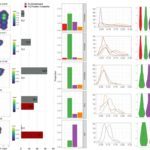Link to Pubmed [PMID] – 31366887
Link to DOI – 10.1038/s41467-019-11385-5
Nat Commun 2019 07; 10(1): 3421
Transposable elements (TEs) are mobile parasitic sequences that have been repeatedly coopted during evolution to generate new functions and rewire gene regulatory networks. Yet, the contribution of active TEs to the creation of heritable mutations remains unknown. Using TE accumulation lines in Arabidopsis thaliana we show that once initiated, transposition produces an exponential spread of TE copies, which rapidly leads to high mutation rates. Most insertions occur near or within genes and targets differ between TE families. Furthermore, we uncover an essential role of the histone variant H2A.Z in the preferential integration of Ty1/copia retrotransposons within environmentally responsive genes and away from essential genes. We also show that epigenetic silencing of new Ty1/copia copies can affect their impact on major fitness-related traits, including flowering time. Our findings demonstrate that TEs are potent episodic (epi)mutagens that, thanks to marked chromatin tropisms, limit the mutation load and increase the potential for rapid adaptation.


